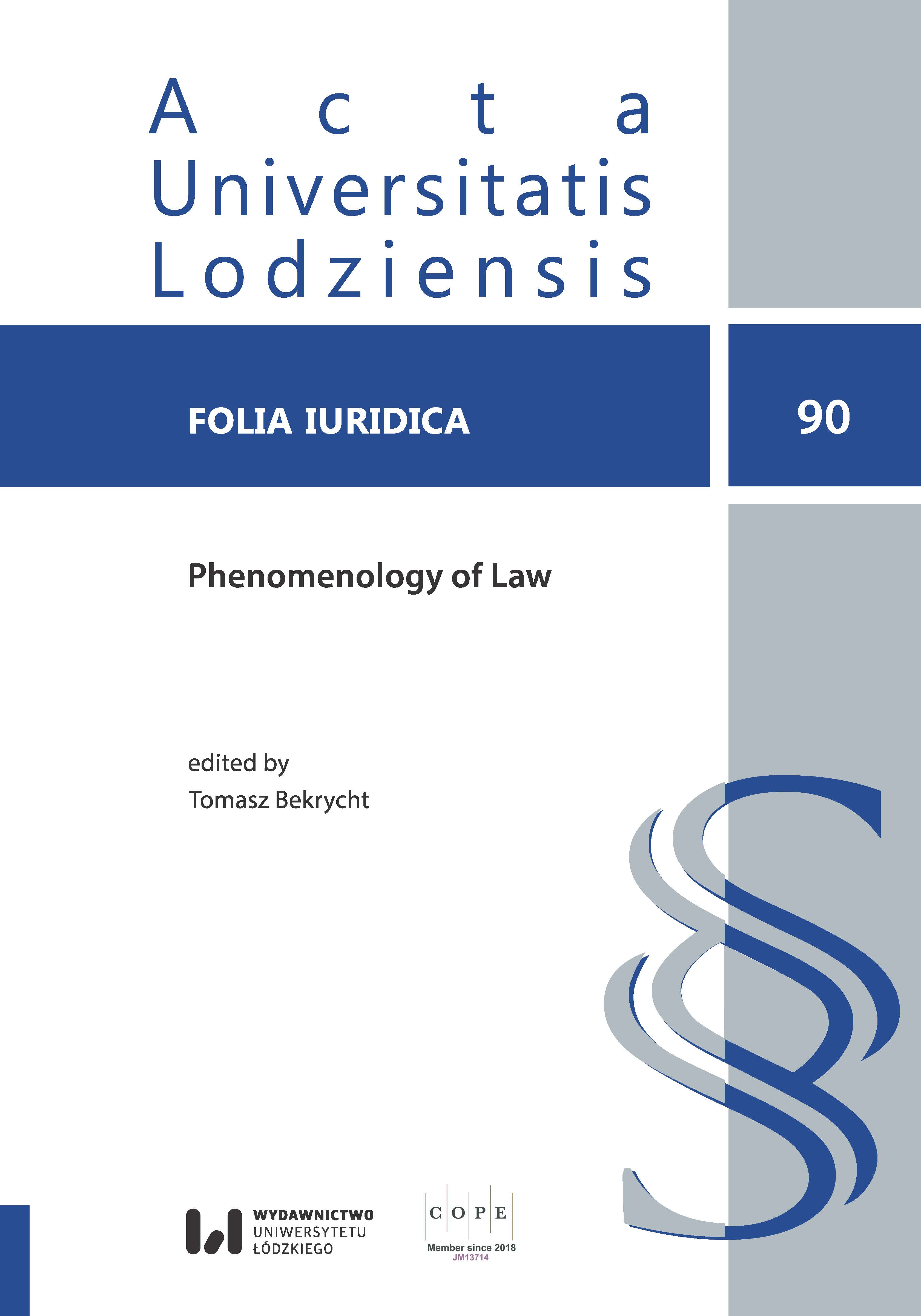Normativity of Prescriptions in Adolf Reinach’s Aprioristic Theory of Right
DOI:
https://doi.org/10.18778/0208-6069.90.04Słowa kluczowe:
description, prescription, law, norm, ideality, ideationAbstrakt
In the Logical Investigations, Edmund Husserl defines that which is normative as the objectively regular with its rules of regularity, which can be recognised rationally – normativity concerns the being itself and the rational cognition of the being (logic as a normative discipline establishing the rules of scientific knowledge, as the science of science). Instead, Adolf Reinach in The Apriori Foundations of the Civil Law defines the notion of norm as polysemantic and distinguishes the legal provisions (the prescriptive sentences), formulated within a given community, from the basic norms which are grounded in the objective (including moral) justness of the states of affairs. The obligation of the being and the obligation of acting exist in themselves, independently from cognition. In turn, “enactments and the propositions which express enactments” as a kind of normative sentences have the character of normalisation, but they require a person to pronounce them. The prescriptions realise and refer to what is objectively being and to the objectivity of what is being and obligatory. In my text, I present Reinach’s position on the relations between norms and provisions (as prescriptive propositions “which express enactments”) referring his theories to the Husserlian concept of normativity.
Pobrania
Bibliografia
Ambroise, Bruno. 2005. “Le problème de l’ontologie des actes sociaux: Searle héritier de Reinach?” Les Études philosophiques 1(72): 55–71.
Google Scholar
DOI: https://doi.org/10.3917/leph.051.0055
Amselek, Paul. 2014. Mettre le droit en valeurs (Rapport présenté au colloque “La valeur, les valeurs, le droit” organisé le 28 novembre 2014 par le Centre d’études et de recherches sur les contentieux de la Faculté de Droit de Toulon). 1–25. http://paul-amselek.com/textes.php [Accessed 14 February 2017].
Google Scholar
Brandom, Robert B. 1998. Making It Explicit. Reasoning, Representing, and Discursive Commitment. Cambridge, MA–London: Harvard University Press.
Google Scholar
Cantegreil, Julien. 2005. “D’une voie phénoménologique en théorie du droit. Remarques sur le réalisme d’Adolf Reinach”. Les Études philosophiques 1(72): 99–112.
Google Scholar
DOI: https://doi.org/10.3917/leph.051.0099
Chérot, Jean-Yves. 2013. “Paul Amselek et la normativité en droit”. Revue de la Recherche Juridique – Droit prospectif (Cahiers de Méthodologie Juridique) 38(27): 1997–2009.
Google Scholar
Conrad-Martius, Hedwig. 1959. “Die Transzendentale und die ontologische Phänomenologie”. In Edmund Husserl, 1859–1959. Recueil commémoratif publié à l’occasion du centenaire de la naissance du philosophe (Phänomenologica, 4). 175–184. Edited by Jacques Taminiaux, Herman L. Van Breda. The Hague: Martinus Nijhoff.
Google Scholar
Derrida, Jacques. 2011. Voice and Phenomenon. Introduction to the Problem of the Sign in Husserl’s Phenomenology. Translated by Leonard Lawlor. Evanston, IL: Northwestern University Press.
Google Scholar
Gardies, Jean-Louis. 1972. Essai sur les fondements a priori de la rationalité morale et juridique. Paris: LGDJ.
Google Scholar
Goyard-Fabre, Simone. 1972. Essai de critique phénoménologique du droit. Paris: Klincksieck.
Google Scholar
Habermas, Jürgen. 1996. Between Facts and Norms. Contributions to a Discourse Theory of Law and Democracy. Translated by William Rehg. Cambridge, MA: The MIT Press.
Google Scholar
DOI: https://doi.org/10.7551/mitpress/1564.001.0001
Husserl, Edmund. 1983. Ideas Pertaining to a Pure Phenomenology and to a Phenomenological Philosophy – First Book: General Introduction to a Pure Phenomenology. Translated by Fred Kersten. The Hague: Martinus Nijhoff.
Google Scholar
Husserl, Edmund. 2001. Logical Investigations. Vol I. Translated by John N. Findlay. London – New York: Routledge.
Google Scholar
Ingarden, Roman. 1992. Einführung in die Phänomenologie Edmund Husserls: Osloer Vorlesungen 1967. Gesammelte Werke. Vol. 4. Edited by Gregor Haefliger. Tübingen: Niemeyer.
Google Scholar
Kant, Immanuel. 1987. Critique of Judgment. Translated by Werner S. Pluhar. Indianapolis – Cambridge: Hackett Publishing Company.
Google Scholar
Kant, Immanuel. 1998. Critique of Pure Reason. Edited and translated by Paul Guyer, Allen W. Wood. Cambridge: Cambridge University Press.
Google Scholar
DOI: https://doi.org/10.1017/CBO9780511804649
Laugier, Sandra. 2005. “Actes de langage et états de choses: Austin et Reinach”. Les Études philosophiques 1(72): 73–97.
Google Scholar
DOI: https://doi.org/10.3917/leph.051.0073
Mayrhofer, Philipp. 2005. “Réalisme et fondation chez A. Reinach”. Les Études philosophiques 1(72): 3–18.
Google Scholar
DOI: https://doi.org/10.3917/leph.051.0003
Mulligan, Kevin. Ed. 1987. Speech Act and Sachverhalt. Reinach and the Foundations of Realist Phenomenology. Dordrecht: Martinus Nijhoff.
Google Scholar
DOI: https://doi.org/10.1007/978-94-009-3521-1
Reinach, Adolf. 1912–1913. “Die Überlegung: ihre ethische und rechtliche Bedeutung”. Part I. Zeitschrift für Philosophie und philosophische Kritik 148: 181–196.
Google Scholar
Reinach, Adolf. 1912–1913. “Die Überlegung: ihre ethische und rechtliche Bedeutung”. Part II. Zeitschrift für Philosophie und philosophische Kritik 149: 30–58.
Google Scholar
Reinach, Adolf. 1913. “Die apriorischen Grundlagen des bürgerlichen Rechtes”. In Jahrbuch für Philosophie und phänomenologische Forschung 1(2): 685–847.
Google Scholar
Reinach, Adolf. 1969. “Concerning Phenomenology”. Translated by Dallas A. Willard. Pacific Philosophical Quarterly (50)2: 194–221. www.dwillard.org/articles/individual/concerningphenomenology-trans.-of-adolf-reinachs-ueber-phaenomenologie [Accessed 5 January 2018].
Google Scholar
Reinach, Adolf. 1983. “The Apriori Foundations of the Civil Law”. Translated by John F. Crosby. Aletheia. An International Journal of Philosophy 3: 1–142.
Google Scholar
Reinach, Adolf. 1989. “Über Phänomenologie”. In Sämtliche Werke: Textkritische Ausgabe in 2 Bänden. 531–550. Edited by Karl Schuhmann, Barry Smith. München: Philosophia Verlag.
Google Scholar
Scheler, Max. 1973. Formalism in Ethics and Non-Formal Ethics of Values. Translated by Manfred S. Frings, Roger L. Funk. Evanston, IL: Northwestern University Press.
Google Scholar
Simons, Peter. 1995. “Meaning and Language”. In The Cambridge Companion to Husserl. 106–137. Edited by Barry Smith, David W. Smith. Cambridge, UK: Cambridge University Press.
Google Scholar
DOI: https://doi.org/10.1017/CCOL0521430232.004
Smith, Barry. 1990. “Towards a History of Speech Act Theory”. In Speech Acts, Meaning and Intentions. 29–61. Edited by Armin Burkhardt. Berlin: Walter de Gruyter.
Google Scholar
DOI: https://doi.org/10.1515/9783110859485.29
Pobrania
Opublikowane
Jak cytować
Numer
Dział
Licencja

Utwór dostępny jest na licencji Creative Commons Uznanie autorstwa – Użycie niekomercyjne – Bez utworów zależnych 4.0 Międzynarodowe.














